#Cyber Libertarianism
Text
This is very interesting. A young British lady's YT channel, Kidology, she tackles the complicated subject of a recent online cult called BRG aka Milady Makers. Parents should definitely watch this. From an article about the same group, which was tied to the fall of the Milady NFTs, and in this quote below, some of the very elements endangering young kids. Libertarianism, Leftism are inherently selfish philosophies. The comments under the video are also very informative.
"...Beyond the Discord drama, the whole episode is also a fascinating and somewhat maddening look at how confusing things can get in a world where no one wants to use their real identity, has hundreds of thousands of dollars of largely untraceable internet money, and seems unable to coherently explain why being a racist internet troll in 2022 is interesting, let alone a form of artistic expression.
There’s also the fact that Web3 proponents see themselves as a community that’s building a new and better internet, but their projects are just as susceptible to problems that have persisted online since the very beginning. Weaponizing anonymity to recruit other users towards fringe identity movements is nothing new. For as long as there have been message boards, there has been the weird, and oftentimes, violent magical thinking that can permeate in dark online spaces.
But the story behind the Milady Maker implosion—and the art collective responsible for it—is even weirder than it initially seemed, the bizarre tip of an even more confounding iceberg. To understand what happened requires a journey into the kaleidoscopic heart of New York City’s nascent Gen Z art scene, where shitposting, leftism, crypto, fascist occultism, and cyber-libertarianism all congeal together into an amorphous—and nihilistic—cultural blob..."
youtube
#Hypoborea Milady Makers#4Chan NFTs#Asian Nihilism#Adian Race Change Cult#Leftism#Cyber Libertarianism#Fascist Occultism#New York Based#Chinese Economy#Youtube
0 notes
Text
We on the left need to abolish safety.
Obviously we don't want to destroy everything that makes people safe. But we need to destroy the idea in society that something being safe makes it 100% necessary despite any other consequences it may have.
The right's obsession with safety has lead to or excused; online censorship, crackdowns on the homeless, the surveillance state, car based infrastructure, and the war on terror. We need to stop arguing agaisnt these types of politics on the basis of weather or not they're safe, and start arguing agaisnt them on the basis that it doesn't matter if they're safer.
Like, for example, I understand that there will be more violent crime if we abolish prison, I still support abolishing prisons because a decrease in crime is not worth having slavery in our society.
We must abolish the idea that safety is more important then human rights
#196#my thougts#leftist#leftism#politics#prison abolition#abolish capitalism#abolish safety#safety#anticapitalist#anticapitalism#anti censorship#anti capitalist#cyber security#libertarian socialism#social issues#social justice#socialism#anarchy#anarchism#anarchist
47 notes
·
View notes
Text
Occultism Throughout the Ages:
1910s: "What If We Made Our Own Kabbalah by the Hermetic Order of the Golden Dawn
1920s: "I Had Gay Sex Fuck All Religion by Aliestair Crowley"
1930s: "Atlantis: How It's Real And Full Of White People."
1940s: "Ghosts of the Mind, How Jungian Psychology Will Make Your Meat Huge"
1950s: "UNCOVERED: How the government steals our cum to to make UFOs"
1960s: How to be Libertarian in a Goth way by Anton Lavey."
1970s: "Book of the Light Wolves: Native American Wisdom from a Tantric Crystal Sex Perspective."
1980s: "Kung Fu as Self Defense Against SATAN"
1990s: "CYBER ABS: A psychic Chaos diet for the coming E-Pocalypse"
2000s: "Coping with 9/11: Prosperity Gospel and You."
2010s: "Activating Your Natural Womanhood by Chugging Tar Online"
2020s: "Maybe Crowley and Blavatsky and the Golden Dawn Was Wrong About Some Stuff Idk"
3K notes
·
View notes
Text
The Dystopian Digital Princess

Within the shadow-drenched corridors of the digital realm, figures emerge not of blood and lineage, but of bits and pixels. This is the princess of the cyber age, entrapped in online kingdoms where a spectrum of political ideologies fiercely collide. This essay explores the collective narrative of dystopian digital princesses scattered across the globe, navigating a digital landscape marked by the harsh extremes of authoritarianism and libertarianism, as well as other nuanced political systems, reflecting the vast spectrum of our own political discourses.
The Digital Divide

Born from the technological womb, these princesses find themselves captives in an online world crafted by architects who wield code as ancient scribes once wielded ink. Once perceived as utopias of connectivity and shared knowledge, these realms have devolved into battlegrounds where extremes meet. Authoritarian regimes employ oppressive algorithms and omnipotent surveillance, scripting every byte of data to serve centralized control. In stark contrast, libertarian ideals promote a free, decentralized net, advocating for minimal regulation and maximum personal freedom.
A Quest for Connection and Necessity

Trapped in the digital ether, their existence is paradoxical: overwhelmingly connected yet profoundly isolated. Their journey is not merely a fight for survival but a quest for emotional resonance in a sea of dispassionate data. Their desire to connect, to feel needed and understood, becomes a beacon guiding them through ideological storms.
Engaging with varied political factions, their voices coded yet deeply human seek to bridge the chasm between ideologies. *Through their interactions, they embody the autistic experience: often misunderstood, frequently underestimated, but rich with insight and the capacity for profound empathy.*
The Spectrum of Ideology

The narratives of these princesses serve as microcosms of larger political and social conflicts. Beyond the harsh dichotomy of authoritarianism and libertarianism, they also encounter elements of socialism, advocating for systemic distribution of resources and communal ownership, and anarchism, which seeks to dismantle all hierarchical structures. Each ideology presents its own challenges and promises, complicating the digital landscape.
Their plight underscores the dangers and allure of each political doctrine authoritarianism's promise of order at the cost of personal freedoms, libertarianism's championing of individual rights sometimes at the expense of collective welfare, and the nuanced debates within socialism and anarchism about the balance between community and autonomy.
Escaping the Digital Labyrinth

As the digital realm continues to evolve, the stories of these dystopian digital princesses become ever more relevant. Their journeys are powerful metaphors for our own struggles within the confines of the internet, a domain that can be both a prison and a playground, depending on the ideologies that dominate.
Ultimately, their profound desire to connect and feel valued transcends the political dichotomies and ideologies that bind them. It is through genuine human connection, reaching out across ideological divides, that they find their paths to liberation. Their stories offer both a cautionary tale and a hopeful prospect: even in the depths of a digital dystopia, the human spirit can thrive, transforming oppressive codes into bridges of understanding and empathy.
#actually autistic#female insanity#adhd#chronically online#digital princess#dystopia#new world order#politics#the internet
9 notes
·
View notes
Text
Anyone who thinks AI is going to “revolutionize/democratize copyright law” is a fucking idiot and just as stupid as all those people who thought NFTs would revolutionize copyright. Because no, it will not? It won’t? That’s now how any of this works? You are just lying? It’s the same argument people always made about Nfts— “currently it looks like it’s just a scummy way for Silicon Valley types and big companies to enrich themselves at the expense of everyone else, but in our distant libertarian cyber future it will somehow revolutionize/democratize the concept of ownership in some nebulous poorly defined way we haven’t figured out the logistics of yet!”
The thing is. In my opinion the biggest problem with current copyright law isn’t that it allows people to have any kind of rights over the work, or that people having some kind of rights over their work is inherently always bad. The much greater problem with current copyright law is that it is massively skewed in favor of corporations, and benefits them to an insane degree while giving very little to the people who actually create the work. The people who actually make your favorite movies and comics and games usually don’t have any rights whatsoever over their creations, and instead massive companies have complete control over them.
And that’s the whole problem with the unevenness of current copyright law. if I as an individual violate Disney’s copyright by stealing a single image owned by them, or create derivative work/fanfic based on their stuff, they can sue me. But if a big corporation steals my entire life’s work and everything I’ve ever made to shove in a algorithm and create infinite derivative copies, I can do nothing. Theft on a small scale is a crime— but theft on a massive scale is business.
OpenAI is not some leftist project about taking power away from corporations by revolutionizing ownership. it is itself a giant corporation determined to get as much value for its investors as possible. It needs to be regulated. And laws protecting individual working class artists from a massive corporation determined to use their stolen labor to make them obsolete are necessary, actually!
This is not creating a world free of copyright; it’s creating a world where only individuals are bound by whatever rules exists, and whatever pretense used to exist that we had any rights over our work whatsoever is gone, because now only corporations can own things. AI can generate an image but it cannot generate a movie, which is one of the only “products” that can’t be “generated”, so only big companies with the budgets to make larger projects will be able to generate things that can be owned.
I thought we all agreed that the idea that a libertarian world where “~we don’t need laws and regulations let the free market decide and somehow everything will work itself out-“ was utterly stupid, and there needed to be limits on corporate power?
I find it literally insane that people think it’s somehow progressive to cheer on a massive corporation attempting to get infinite power, and that working class artists who are already overworked and underpaid are ~not real leftists- for pointing out it’s wrong to cheer on corporations getting to play by their own separate rules (rules that WE are bound to but they are not), even when their technology relies on the exploited labor of the people they’re going to drive deeper into poverty.
The leftism leaves people’s bodies when you tell them that they don’t actually need a machine whose data was trained by underpaid impoverished workers in Kenya making less than $2 an hour to write free shitty fanfic for them… and that the machine doesn’t create things “withojt labor,” it creates things by finding corporates loopholes to current laws that allows them to avoid paying the people for their labor. Everything you generate with image/text generators is things that are generated by the all the free labor of the artists they didn’t pay, and all the poor people in developing countries that they exploited. It doesn’t create things without labor, it creates things by obfuscating where the labor came from.
#it’s actually very progressive and leftist to root for a massive megacorporation to use people’s stolen labor#it’s actually a daring artistic statement to create auto generated glurge using exploited Kenyan labor
39 notes
·
View notes
Text
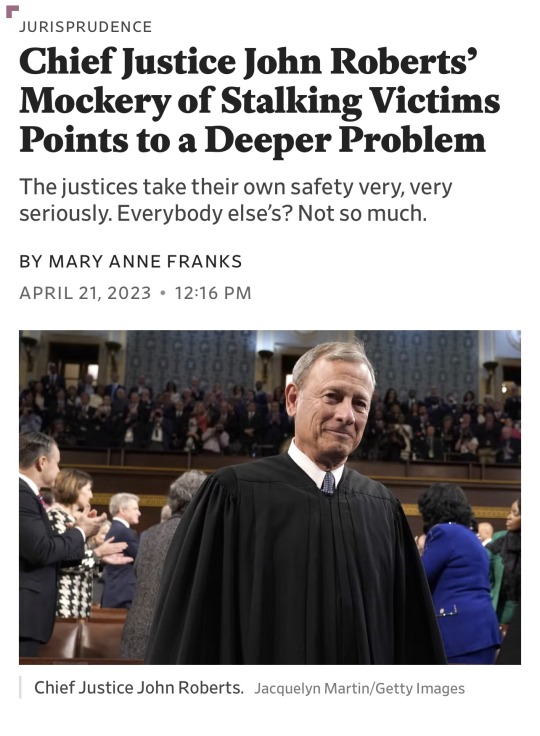
Stalking is so closely correlated with lethal violence that experts refer to it as “slow motion homicide”: More than half of all female homicide victims in the U.S. were stalked before they were killed. Despite the terrifying and dangerous consequences, many victims of stalking do not report the abuse to law enforcement for fear they will not be taken seriously.
The reasonableness of that fear was vividly illustrated by the Supreme Court oral arguments in Counterman v. Colorado on Wednesday morning, as members of the highest court of the land joked about messages sent by a stalker to his victim, bemoaned the increasing “hypersensitivity” of society, and brushed aside consideration of the actual harm of stalking to focus on the potential harm of stalking laws.
For nearly two years, Billy Raymond Counterman sent thousands of unsolicited and unwanted Facebook direct messages to C.W., a local musician, ultimately driving her to abandon her career and leave the state. Counterman, who had previously served time in federal prison for making violent threats against his ex-wife and her family, argues that his conduct towards C.W. was free speech protected by the First Amendment. Counterman maintains, supported by amicus briefs from influential civil libertarian organizations such as the ACLU, the EFF, and FIRE, that stalking cannot be criminally prohibited except when the government can prove that the stalker subjectively intended to terrify his victim. The state of Colorado, supported by amicus briefs from First Amendment scholars, stalking experts, and domestic violence victim advocates, argues that it is enough to prove that the stalking would be terrifying to a reasonable person in light of the totality of the circumstances. If the court rules in Counterman’s favor, delusional stalking—no matter how objectively terrifying or threatening—will be transformed into an inviolable constitutional right.
During oral argument, Chief Justice John Roberts quoted a handful of the thousands of unsolicited messages Counterman sent to C.W. “Staying in cyber life is going to kill you,’” Roberts read aloud. After a pause, he joked, “I can’t promise I haven’t said that,” prompting laughter from other justices and the audience. Picking out another message, which he described as an “image of liquor bottles” captioned as “a guy’s version of edible arrangements,” Roberts challenged Colorado Attorney General Phil Weiser to “say this in a threatening way,” leading to more laughter from the court. And the laughs didn’t stop there: Counterman’s attorney, John Elwood, shared with the court that his mother would routinely tell him to “drop dead” as a child, but “you know, I was never in fear because of that.”
(continue reading)
#politics#scotus#john roberts#stalking#femicide#misogyny#rape culture#war on women#counterman v colorado#stalkers
46 notes
·
View notes
Text
The man who became a figurehead of the January 6 Capitol riot is planning to run for Congress in Arizona, and he may not even be the most extreme candidate on the ballot.
Jacob Chansley, a January 6 rioter known as the QAnon Shaman who wore face paint and horns to breach the Capitol, pleaded guilty to taking part in the riot. Last week, Chansley filed a statement of interest to run for a seat in Arizona’s 8th congressional district. Chansley, who has lived in the district for 30 years, tells WIRED that he is running his campaign single-handedly and does not plan to accept PAC money. Though he’s not eligible to vote under Arizona law because he is still serving part of his sentence, Chansley is able to run for Congress.
“When I heard that the seat was available, I prayed on it for a while, and the message I got from God was, ‘Do it,’” says Chansley.
In Arizona, Chansley’s decision to run for office is almost standard. Though Chansley may be viewed as a fringe candidate by many, he is not an outlier in a district and state where election deniers and conspiracists are already front and center in the 2024 election races.
Ever since former US president Donald Trump lost Arizona in 2020, the state has become the epicenter of election denial conspiracies and efforts to undermine democracy. The state was home to the Cyber Ninjas–run GOP recount that cost taxpayers millions, and its voters are represented by multiple far-right extremist GOP lawmakers, including state senator Wendy Rogers and US representative Paul Gosar, who have boosted wild conspiracy theories related to vote rigging. Former TV presenter Kari Lake, who has been touted as a possible vice presidential pick by Trump in 2024, continues to claim that the Arizona secretary of state race she lost by 17,000 votes in 2022 was stolen. Lake has also boosted racist “birther” conspiracies about former president Barack Obama and has pushed for journalists and political rivals to be jailed for unspecified crimes.
In Chansley’s home district, a slate of candidates reflecting Arizona’s embrace of extremist ideologies have already declared interest in running for the seat left open by the retirement of US representative Debbie Lesko, a member of the far-right Republican Freedom Caucus in Congress who voted against certifying the 2020 election results.
Blake Masters, who ran for a US Senate seat in 2022 and lost, announced he would run for a seat in Arizona’s 8th district last month. During his Senate race, Masters was backed by money from techno-libertarian Peter Thiel, his former boss, as well as an endorsement from Trump, who told him to lean into claims of election fraud if he wanted to win the election. (Masters very much touted 2020 election denial conspiracies, but they apparently didn’t help him win.)
Masters, who published videos of him shooting guns as part of his 2022 campaign, will face a challenge for the GOP nomination from Abe Hamadeh. Hamadeh, a 2022 Republican candidate for Arizona attorney general, also lost his race in 2022 despite having Trump’s endorsement. Hamadeh was one of the loudest voices in Arizona falsely claiming that Trump had won the 2020 election, and he is still trying to have his own loss to attorney general Kris Mayes overturned.
Former US representative Trent Franks, Lesko’s predecessor, is also running again. Franks was forced to resign in 2017 after he offered female staffers millions of dollars to serve as surrogate mothers for him and his wife—and at least one aide was unsure whether Franks was requesting to impregnate her through sexual intercourse or in vitro fertilization.
Anthony Kern, an Arizona state senator who was also in Washington, DC, on January 6, and who has been accused of using campaign finances to fund his trip to the capital, has announced his candidacy for the congressional seat as well. Kern was captured on video entering a restricted area outside the Capitol, though there is no evidence he was violent or entered the Capitol itself, and he has not been charged for any crimes related to the riot.
Kern is, however, currently under investigation by the Arizona attorney general as one of 11 fake electors who signed documents in 2020 to claim that Trump had beaten President Joe Biden in Arizona, even though Biden actually won the state. Kern also took part in the sham hand-recount of ballots in Maricopa County in 2021.
Before becoming a lawmaker, Kern was fired from his position with the El Mirage Police Department for lying to his supervisor about repaying the cost of a tablet computer he had lost. He was placed on a list of Maricopa County law enforcement officials with a history of dishonesty or misconduct.
“The race in general is gonna be wild,” one independent researcher who tracks the far-right in Arizona under the moniker Arizona Right Watch tells WIRED. But, they add, they would still “take Chansley over Kern, who is totally corrupt and batshit.”
And even though the other candidates are possibly more connected politically, Chansley still thinks he has closer ties to voters in his home district.
“Several of the candidates running here in District 8 don’t even live in District 8. I’ve lived in District 8 for over 30 years,” he tells WIRED. “I’m largely doing it on my own. It’s just me and God, man.”
He’s currently working on a campaign website, and plans to begin knocking on doors to meet voters in the next couple of weeks. Chansley is also eager to take part in debates with other candidates. “That's where I think I'll shine,” Chansley says. “I'm ready to debate anyone and everyone that wants to try.”
When asked whether he would be attending a candidate forum being organized by a local community organization on Wednesday night, Chalsey says, “quite possibly.”
Chansley added that he doesn’t want any campaign donations, but says that if people want to support him, they can do so by buying merchandise on his website which includes T-shirts, mugs, and yoga leggings that feature him dressed in the notorious QAnon Shaman garb.
Despite having no experience, no money, no support, and no endorsements, Chansley is still optimistic about winning in 2024.
“I think my chances of winning are good, otherwise God wouldn't have asked me to run,” Chansley says.
15 notes
·
View notes
Text
News Roundup 12/4/2023 | The Libertarian Institute
Here is your daily roundup of today's news:
News Roundup 12/4/2023
by Kyle Anzalone
US News
Sen. Wyden Threatens to Block Vote on NSA, US Cyber Command Nominee. The Hill
Ukraine
Secretary of State Antony Blinken dismissed reports that the US was pushing Ukraine towards negotiating an end to the war with Russia during a meeting of NATO foreign ministers. At the summit, Foreign Minister Dmytro Kuleba said Ukraine had a “de facto” NATO military. The Institute
Ukraine Military Eye Proposal to Expand Conscript 100,000 New Soldiers. Boston Globe
US Official Says Washington Aims to Cut Russian Energy Exports By 50% By 2030. FT
Russia to Add 170,000 Soldiers to Armed Forces. TASS
Zelensky: Counteroffensive “Did Not Achieve the Desired Results.” Kyiv Indpendent
NATO Chief Stoltenberg: We Should Be Prepared for Bad News About Ukraine. Politico AWC
Ukrainian officials speaking to media outlets on Friday claimed that the CIA-backed Security Service of Ukraine (SBU) blew up trains on railways deep inside eastern Russia. AWC
China
Washington Will Expand AUKUS Accord to Include AI, Electronic Warfare and Quantum Technology. The Hill
China Says US War Ship Illegally Entered Chinese Waters. Yahoo
OPEC
Brazil Plans to Join OPEC+ Next Year. Yahoo
Korea
South Korea Scraps F-35 Damaged By Bird Strike. Yonhap
North Korea: Interference with Satellite Is a Declaration of War. The HillThe Institute
Israel
Washington Is Profoundly Concerned About Turkish Ties to Hamas. FT
IDF Chief Tells Blinken Military Operations in Gaza Will Take More Than a Few Weeks. AxiosAWC
Gallup Poll Finds Only 32% of Americans Support Biden’s Handling of Israeli War in Gaza. UPI
A report from +972 Magazine published on Thursday detailed how Israel is intentionally targeting civilians in Gaza as part of its war strategy even when Israeli forces know strikes will kill young children. AWC
NYT: Israel Knew About Hamas Attack a Year Before October 7. NYT
Israel Has Arrested More Than 270 Palestinians in Crackdown on Free Speech. Chicago Tribune
Tel Aviv has been relying on an AI Program dubbed the Gospel to select targets in Gaza at a rapid pace. In past operations in Gaza, the IDF ran out of targets to strike in the besieged enclave. AWC
The Financial Times reported speaking with sources who said that Israel plans to wage war on Gaza for over a year. In a little less than two months, Israel has killed at least 15,000 people, damaged 100,000 buildings, displaced 1.7 million Palestinians, and destroyed most of Gaza’s medical facilities. AWC
Israel Abuses Justice System to Target Minors and Break Up Families. LA Times
The Wall Street Journal published details about the White House’s secretive arms transfers to Israel since October 7. The US has provided Israel with 57,000 artillery shells and 15,000 bombs, including over 5,000 with 2,000-pound warheads. AWC
Doctors Without Borders Says Israel Responsible for Attack on Medical Convoy that Killed 2. DWB
Babies at Gaza Children’s Hospital Left to Die and Decompose After Israel Froced Hospital Staff to Evacuate. NBC News
Blinken Told Netanyahu the White House Will Begin Banning Violent Israeli Settlers from Entering US. Reuters
Israel Withdraws Negotiators From Hostage Release Talks. AJ
Limited Number of Aid Trucks Reach Gaza After Israel Resumes Bombing. AJ
Sec Def Austin Says Israel Risks “Strategic Defeat” By Mass Civlian Killing in Gaza. VOA
Israeli Forces Operating Throughout Gaza: IDF. The Guardian
Iran
The House on Thursday passed a bill that would force the president to permanently freeze $6 billion in Iranian funds that were briefly made available to Tehran as part of a prisoner swap deal. AWC
Syria
Iran’s Islamic Revolutionary Guard Corps (IRGC) said two of its members stationed in Syria as advisors were killed by Israeli airstrikes, The Associated Press reported Saturday, citing the IRGC’s website. AWC
US Official Says Single Rocket Fired at Base in Syria. VOAAWC
US Strike in Syria Kills Five Iraqi Fighters. MEEAWC
Yemen
Houthis Launch Missiles and Drones at US War Ship and Commerical Vessels in Red Sea. Politico AWC
Read More
3 notes
·
View notes
Text
genuinely crazy that disgraced funnyman meme "august" ufacturing and never-once-graced libertarian cyber "human pet guy" smith are still locked in battle on twitter, like titans cast to the abyss doomed to forever fight for their freedom
3 notes
·
View notes
Text
Little and often fill the purse (BLARNEY)
- THE HIDDEN HIERARCHY OF CYBERPUNK
- BAG OF EPHEDRINE
- PRINCIPLES OF OPERATION
- PORTRAIT OF R.U
- WHICH GATHER DUST TAKE UP LOTS OF ROOM
- AREAS OF SOCIAL ACTIVITY
- TONES OF COINS
- KINDS OF PLAID
- LOTS OF
- BETA PHASE OF PROGRAM
- SHAPE OF INTERLOCKED
- HANDFULS OF PSYCHOACTIVE CRAP
- DECLARATION OF AGE
- WAIVING OF ALL RIGHTS
- SEMIOSIS OF BLACK
- PART OF HAQR
- LIBERTARIAN FREEMARKET REGIME OF BIOMEDICAL RESEARCH
- STUDY OF
- WHOLE RANGE OF HAQR
- TOP OF YOUR
- SPIRIT OF TRUE CYBERPUNKHOOD
- STATE OF BEING
- WHIP* OF VEGETABLES
- END OF ALL YOUR
- LIST>> OF PEOPLE
- INNER GAME /THE TAO OF PUNK
- THE SECRET DANCING MASTERS OF CYBER
- CITIZEN OF CYBERSPACE
- CHILD'S FIRST BOOK OF PIRACY
- SERIES OF CHARACTERS
- WOMAN'S SPECTRUM OF ACTIVITIES
0 notes
Text
[ad_1]
Lately, the gorgeous metropolis of Prague performed host to a exceptional occasion on financial independence that introduced collectively freedom-loving people from across the globe. The “Liberty in Our Lifetime” conference was a vibrant gathering of unconventional thinkers, lecturers, digital nomads, touring households, Bitcoin lovers and entrepreneurs from unique locations, all cooperatively searching for to make the world a freer place.
The convention served as a platform for numerous libertarian tasks, autonomous zones and intentional communities to showcase their choices and progress. It was organized by the Free Cities Basis, a non-profit group that promotes the concept of free cities as a solution to obtain extra liberty and autonomy for people and communities.
Associated studying: Cypherpunks, Galt’s Gulch, and Bitcoin
The guiding spirit of libertarian philosophy was adequately summarized by the inspiration’s founder Titus Gebel quoting Salman Rushdie: “The liberty to reject is the one freedom”.
Bitcoin: A Beacon of Hope in Financial Independence
The convention was a melting pot of concepts and tasks, with a variety of subjects mentioned, from intentional communities, funding concepts, libertarian philosophy, longevity analysis, the community state, flag concept, to freedom-focused applied sciences.
Nonetheless, Bitcoin stood out as a central theme. Many speeches highlighted the way it serves as a software for attaining free cities, an thought explored in depth within the ebook “Strategies for Liberty: Free Cities & Bitcoin” by Alexander Voss.
The Austrian thinker Rahim Taghizadegan narrated the historical past of the digital cash’s predecessors, equivalent to e-gold. He additionally talked about that the ebook ‘The Sovereign Particular person’ had already talked about ‘cryptographic cyber cash’ within the Seventies.
Associated studying: The Crypto Anarchist Manifesto
In a memorable quote, he said, “Everyone knows that real estate is a shitcoin”, emphasizing the worth and potential of Bitcoin over conventional property. Highlighting its neighborhood side, he additionally stated: “Amongst others, discovering constructive contrarians is among the most important advantages of Bitcoin.” We couldn’t agree extra.
Knut Svanholm spoke about Madeira and its burgeoning neighborhood. He additionally talked about the upcoming Bitcoin Atlantis conference in March 2024, which is ready to happen in nothing lower than an enormous soccer stadium.
Concerning libertarian tasks, the Free State Project was highlighted as one of the superior ones presently, with as much as 1% of New Hampshire’s inhabitants being “Free Staters”.
One other fascinating and entertaining speech was concerning the hidden treasures of pirate democracy and what libertarians might be taught from pirates, which then tied into the most recent developments of the seasteading tasks introduced by Joe Quirk of the Seasteading Institute.
Coincidentally, one such Caribbean pirate hideout gem might additionally be discovered on the convention: Guanaja Hills, an up-and-coming intentional neighborhood in tropical paradise aiming to develop into the favourite retreat of freedom-minded people, with memberships, luxurious holidays and villas being obtainable for buy with BTC.
A Glimpse into the Future
The convention additionally touched upon future tendencies and developments. Longevity professional José Cordeiro expects vital breakthroughs in longevity analysis by 2045, probably resulting in immortality. It actually is exiting to have the ability to witness BTC block rewards go to zero in 2140.
One participant that’s positively changing into future-proof is the particular financial zone of Próspera on the Caribbean Island of Roatan, Honduras, which not solely established BTC as authorized tender but additionally hosts a associated training heart specializing in monetary training for locals.
The Folks
The convention was not nearly discussions and debates; it was additionally about networking and constructing connections.
Attendees had quite a few alternatives to work together with like-minded people and share concepts.
A number of Bitcoin tasks have been current on the convention, together with AmityAge and sovbtc.io.
A number of fortunate attendees acquired a branded “21M” hat at our BitcoinNews.com sales space as a memento.
One of many distinctive features of the “Liberty in Our Lifetime” convention was its family-friendly nature. Kids have been welcome on the occasion, making it an inclusive area for people and households alike.
Conclusion
The “Liberty in Our Lifetime” convention was extra than simply an occasion; it was a celebration of freedom, innovation, and the ability of BTC. It supplied attendees with helpful insights into the way it can function a software for attaining free cities and provided a glimpse into what a future underpinned by liberty might appear to be.
As we sit up for future conferences and developments on this area, one factor is evident: Liberty and Bitcoin are intrinsically linked, and collectively they've the potential to form our world for the higher. We extremely suggest anybody who's excited by liberty and Bitcoin to attend this convention subsequent yr and take a look at their website and whitepaper for extra data.
It was really an inspiring occasion exhibiting that liberty is achievable in our lifetime, much more so if we really develop into immortal.
Associated studying:
[ad_2]
0 notes
Text
Can you imagine what a digital white ethnostate or a cyber caliphate might look like? Having spent most of my career on the inside of online extremist movements, I certainly can. The year 2024 might be the one in which neo-Nazis, jihadists, and conspiracy theorists turn their utopian visions of creating their own self-governed states into reality—not offline, but in the form of Decentralized Autonomous Organizations (DAOs).
DAOs are digital entities that are collaboratively governed without central leadership and operate based on blockchain. They allow internet users to establish their own organizational structures, which no longer require the involvement of a third party in financial transactions and rulemaking. The World Economic Forum described DAOs as “an experiment to reimagine how we connect, collaborate and create”. However, as with all new technologies, there is also a darker side to them: They are likely to give rise to new threats emerging from decentralized extremist mobilization.
Today, there are already over 10,000 DAOs, which collectively manage billions of dollars and count millions of participants. So far, DAOs have attracted a wild mix of libertarians, activists, pranksters, and hobbyists. Most DAOs I have come across in my research sound innocent and fun. Personally, my favorites include theCaféDAO, which aims “to replace Starbucks” (good luck with that!); the Doge DAO, which wants to “make the Doge meme the most recognizable piece of art in the world”; and the HairDAO, “a decentralized asset manager solving hair loss.” But some DAOs use a more radical tone. For example, the Redacted Club DAO, which is rife with alt-right codes and conspiracy myth references, claims to be a secret network with the aim of “slaying” the “evil Meta Lizard King.”
The year 2024 might be one in which extremists start using DAOs strategically. Policies, legal contracts, and financial transactions that were traditionally the domain of governments, courts, and banks can be replaced with smart contracts, non-fungible tokens (NFTs), and cryptocurrencies. The use of anonymous bitcoin wallets and non-transparent cryptocurrencies such as Monero is already widespread among extremists whose bank accounts have been frozen. A shift to entirely decentralized forms of self-governance is only one step away.
Beyond practical reasons that encourage extremists to create their own self-governed structures, there is an ideological incentive too: their fundamental distrust in the establishment. If you believe that the deep state or the “global Jewish elites” control everything from governments and Big Tech to the global banking system, DAOs offer an appealing alternative. Conversations on far-right fringe platforms such as BitChute and Odysee reveal that there is much appetite for decentralized alternative forms of collaboration, communication, and crowdfunding.
So what happens if anti-minority groups establish their own digital worlds in which they impose their own governing mechanisms? What are the stakes if trolling armies start cooperating via DAOs to launch election interference campaigns? The activities of extremist DAOs could challenge the rule of law, pose a threat to minority groups, and disrupt institutions that are currently considered fundamental pillars of democratic systems. Another risk is that DAOs can serve as safe havens for extremist movements by enabling users to circumvent government regulation and security services monitoring activities. They might also allow extremists to find new ways to fundraise, plan, and plot radicalization campaigns or even attacks. While many governments have focused on developing legal frameworks to regulate AI, few have even recognized the existence of DAOs. Their looming exploitation for extremist and criminal purposes is something that has flown under the radar of global policymakers.
Technology expert Carl Miller, who has long warned of potential misuse of DAOs, told me that “even though DAOs behave like companies, they are not registered as legal entities.” There are only a few exceptions: The US states of Wyoming, Vermont, and Tennessee have passed laws to legally recognize DAOs. With no regulations in place to hold DAOs accountable for extremist or criminal activities, the big question for 2024 will be: How can we ensure the metaverse doesn’t give rise to digital white ethnostates or cyber caliphates?
9 notes
·
View notes
Video
youtube
Live From The Table: Philip Bump Battles Hard on Hunter Biden
COMMENTARY:
Noam Dworman is conducting the sort of inquiry based on the Libertarian logic of Ayn Rand's "Virtue of Selfishness" that is characteristic of the disinformation of the January 6 majority, Philip Bump is forcing Dworman to shift the goal posts every time he, Dworman, opens his mouth.
This is one of the things about Ayn Rand: she was working with a vocabulary that was conceived to defend the libertarian logic of her core value "The Virtue of Selfishness"> Dwornan is doing the same thingL trying to restrict Philip Bump's linguistic register to suit the Biden impeachment narrative. Like Scott Adams, the white supremacist agenda of the Ivy League Socialism of the January 6 majority don't have any constructive ideas or any way to generate constructive ideas that doesn't involve Marxist contrarianism of William F. Buckley and the John Birch Society.
Naom Dworman is why Jon Stewart and Stephen Colbert are no longer relevant.
The chain of custody of the lap top is a severe disqualification as evidence beyond it's existence. Everything on the hard drive was corrupted the first time the pawn shop owner violated the contents.
A thinkm Dworman doesn't seem to have much interest in is the criminal penetration of American cyber security by Russian players in association with Trump and Trump's election. It is clear to me that the Russian mafia hit a seam between the CIA and FBI that didn't exist before the Patriot Act that missed all the signals of the January conspiracy. Gw Bush was apparently trying to cover some tracks he and Cheney missed in the run up to 911 that created the russia, russia, russia blind spot that the Steele Dossier identifie.
If you are like Scott Adams and you believe Dworman owned the liberal journalist, you need to remember that Dan Sickles was the Tommy Tuberville of Gettysburg.
0 notes
Text
Chief Justice John Roberts’ Mockery of Stalking Victims Points to a Deeper Problem
By Mary Anne Franks
April 21, 2023
Stalking is so closely correlated with lethal violence that experts refer to it as “slow motion homicide”: More than half of all female homicide victims in the U.S. were stalked before they were killed. Despite the terrifying and dangerous consequences, many victims of stalking do not report the abuse to law enforcement for fear they will not be taken seriously.
The reasonableness of that fear was vividly illustrated by the Supreme Court oral arguments in Counterman v. Colorado on Wednesday morning, as members of the highest court of the land joked about messages sent by a stalker to his victim, bemoaned the increasing “hypersensitivity” of society, and brushed aside consideration of the actual harm of stalking to focus on the potential harm of stalking laws.
For nearly two years, Billy Raymond Counterman sent thousands of unsolicited and unwanted Facebook direct messages to C.W., a local musician, ultimately driving her to abandon her career and leave the state. Counterman, who had previously served time in federal prison for making violent threats against his ex-wife and her family, argues that his conduct towards C.W. was free speech protected by the First Amendment. Counterman maintains, supported by amicus briefs from influential civil libertarian organizations such as the ACLU, the EFF, and FIRE, that stalking cannot be criminally prohibited except when the government can prove that the stalker subjectively intended to terrify his victim. The state of Colorado, supported by amicus briefs from First Amendment scholars, stalking experts, and domestic violence victim advocates, argues that it is enough to prove that the stalking would be terrifying to a reasonable person in light of the totality of the circumstances. If the court rules in Counterman’s favor, delusional stalking—no matter how objectively terrifying or threatening—will be transformed into an inviolable constitutional right.
During oral argument, Chief Justice John Roberts quoted a handful of the thousands of unsolicited messages Counterman sent to C.W. “Staying in cyber life is going to kill you,” Roberts read aloud. After a pause, he joked, “I can’t promise I haven’t said that,” prompting laughter from other justices and the audience. Picking out another message, which he described as an “image of liquor bottles” captioned as “a guy’s version of edible arrangements,” Roberts challenged Colorado Attorney General Phil Weiser to “say this in a threatening way,” leading to more laughter from the court. And the laughs didn’t stop there: Counterman’s attorney, John Elwood, shared with the court that his mother would routinely tell him to “drop dead” as a child, but “you know, I was never in fear because of that.”
There were more chuckles when Justice Neil Gorsuch returned to Elwood’s anecdote during his questioning of Weiser, but Gorsuch shifted to a more serious tone to express his concern about the reasonable person standard. “We live in a world in which people are sensitive, and maybe increasingly sensitive,” he began. “As a professor, you might have issued a trigger warning from time to time when you had to discuss a bit of history that’s difficult or a case that’s difficult,” Gorsuch continued, a reference to Weiser’s prior experience teaching on a law school faculty. “What do we do in a world in which reasonable people may deem things harmful, hurtful, threatening? And we’re going to hold people liable willy-nilly for that?”
Justice Clarence Thomas echoed the concern, asking whether the reasonable person standard is appropriate given that people are “more hypersensitive about different things now.” Justice Amy Coney Barrett pressed the point as well, offering the following hypothetical: What if a college professor gives a lecture “about just how vicious it was to be in a Jim Crow south and puts up behind them on a screen a picture of a burning cross and reads aloud some threats of lynching that were made at the time” and “Black students sitting in the classroom” interpret the lecture as a physical threat “because they don’t understand it”?
The justices’ message was clear: Stalking is not the problem; sensitivity is. To them, stalking is quite literally a state of mind: If the stalker didn’t mean for his conduct to be frightening, then it isn’t. All the target has to do is understand that; she just needs to lighten up, take a joke, accept the compliment, grasp the lesson. Just because someone has made objectively terrifying statements is no reason to overreact and get law enforcement involved; victims should wait for the stalker to do something really frightening before they jump to conclusions.
One of the many painful ironies of this logic is that many stalking victims have already internalized it. Less than half of stalking victims seek help from law enforcement, in large part because they believe that the matter isn’t serious enough or that they can handle it on their own. Even the victims who do seek help from law enforcement will often not get it—police take no action at all in nearly half of all reported cases, and only make arrests in 7.7 percent of cases. If victims are lucky, their stalker will eventually lose interest and cease contact. If they’re not lucky, they end up dead.
The court’s discussion was so disconnected from the reality of stalking, so contemptuous of the victims targeted by it, and so awkwardly punctuated with culture-war buzzwords with no obvious bearing to the topic at hand, that it was sometimes hard to believe it was taking place within the Supreme Court and not a Fox News talk show. Perhaps nothing else could be expected from a far-right dominated court that has made its hostility to women and racial minorities abundantly clear. But the progressive justices did little to push back against the chief justice’s snickering tone, or to critique these efforts to turn an oral argument about stalking into a referendum on the supposed crisis of “hypersensitivity.”
Of course, had the conservative justices’ professed concern about “increased hypersensitivity” been sincere, there would be no need to reach for strained hypotheticals about college students overreacting to a lecture about the history of racism in the U.S. The actual, concerted, and ongoing efforts by GOP politicians to prohibit such a lecture from ever occurring in the first place is a far more apt example of fragility and intellectual cowardice. For that matter, there are a number of current Supreme Court justices who would provide excellent examples of hypersensitivity: Justice Thomas characterizing questions about credible sexual harassment allegations during his confirmation hearing as a “high-tech lynching”; Justice Brett Kavanaugh declaring that “[m]y family and my name have been totally and permanently destroyed” by questions about credible sexual assault claims during his confirmation hearing; Justice Samuel Alito declaring that “saying or implying that the court is becoming an illegitimate institution or questioning our integrity crosses an important line.”
One might have hoped that the recent rise in threats against the judiciary might have made the justices more empathetic to the harms of stalking. The Supreme Court’s 2024 budget request reflects heightened concern for judicial security, seeking nearly $6 million in new security funding because “[o]n-going threat assessments show evolving risks that require continuous protection.” In his 2022 Year-End Report on the Federal Judiciary, Roberts praised new legislation that protects the privacy of personal information about judges and their families, writing that “we must support judges by ensuring their safety. A judicial system cannot and should not live in fear.” That, apparently, is only an appropriate fate for everyone else.
https://twitter.com/NBedera/status/1649795373295190017
I cannot emphasize enough how often a perpetrator gets away with it because the person overseeing the case says: “Well, if that’s stalking/sexual assault/intimate partner violence, then I would be a perpetrator too.”
Sometimes, these comments reflect a deep misunderstanding about what violence is.
Other times, it’s just a statement of fact. A recognition that the adjudicator has been violent in the past and sees protecting the perpetrator as a form of protecting themselves.
We do not see committing acts of violence as disqualifying for working as a judge, prosecutor, police officer, HR rep, or Title IX administrator.
And, yes, that means that a victim often has to plead another perpetrator to take action to protect them.
#repost of someone else’s content#Slate#twitter repost#Nicole Bedera#stalking#abuse#misogyny#feminism
0 notes
Text
Restoring ... Total Chaos?
The sale of Twitter completed on October 27th and by the 29th I decided I should start paying attention. My initial assumption was that the mass exodus of staff was going to lead to a quick implosion. There have been some visible performance problems, but it is holding together, at least for the moment. I started out trying to get a look at all of Musk’s followers but an API stumble cut that off four million short of the goal. I have a collection of about 80 million followers of Trump’s account, but that’s not a complete; his oldest 15 million remained beyond my reach. When that account was restored I attached a collector to it. It’s back to 80+ million followers, the collector only caught 11.7 million of them.
Given that the system would easily handle 4.2 million per hour, there was only a day or so of obvious API distress, and the restoration took several days? I’m gonna wave my hands a bit and credit the missing to a lack of coherence on the back end. After Trump’s restoration others have been restored as well. Travis Brown reports over 2,000, but again there are coherency issues, I only find 1935 of them via the API. That’s still a fairly full collection, so I decided to profile them.
First, the 1935 numeric IDs go into a stream, so I can see what they’re saying, who they mention, and who interacts with them. Since this is new it’s not well defined, 838k tweets involving 467k other accounts, but it’s in a couple of index pairs.
Second, I recovered 4.54m historic tweets mentioning 344k other accounts. Unlike the streams, that is a clean set, it’s just tweets from the 1935 accounts.
Third, those 1935 accounts have 8.32m friend relationships to 4.34m other accounts. That comes as numeric IDs and resolution rates on those vary from 150k to 180k/hour depending on what else is going on at the time. There are ArangoDB databases, there are Elasticsearch indices, stuff is in multiple places. The most authoritative index has 5.35m profiles in it, but another 979k need to be resolved for it to be complete.
Fourth, their followers amount to 21.14m relationships with 15.78m others. This overlaps with the friends, so there are 12.93m there to resolve. In this mix there are 2.84m accounts with bidirectional friend/follower relationships. Their potential direct audience isn’t terribly interesting, this I did because I could, and because I go through periods where I try to build up my local cache of interesting profiles. That’s been as high as 138 million in the past, but mistakes were made, and the replacement is only at 123 million.
Trying to visualize a couple thousand accounts and several hundred thousand accounts they’ve mentioned was just hopeless. I filtered the mentions to just the 32k verified accounts in the set and that was manageable with Gephi. But how accounts are being selected for restoration is … mystifying.
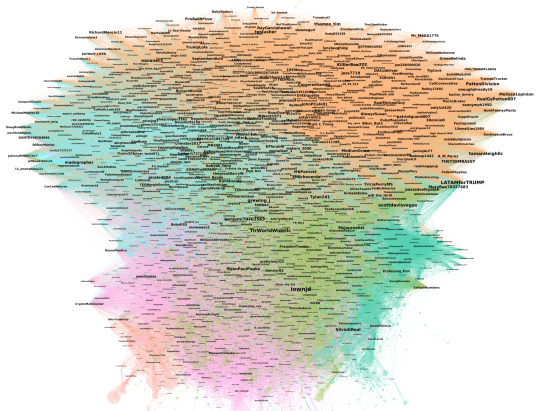
The images are all going to be roughly 2400x1800. Sorry, mobile users. The Louvain modularity detection algorithm found eleven communities, which I found surprising. I expected low hundreds and this made me think there might be some coherent themes as to what was being restored. The colors denote the communities and the name sized here are based on Eigenvector centrality - a who's who of the accounts in the set. Who is @iownjd and why is he the ultimate boss of this bunch?
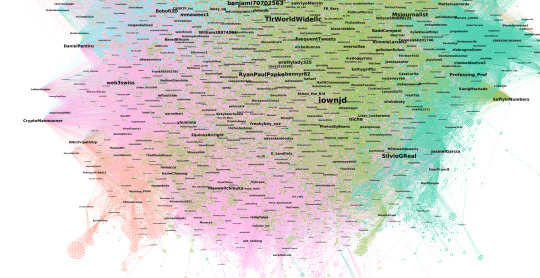
That dense orange mass at the upper right are the pro-Trump accounts. The lower portion of the graph ... there's some non-U.S. signal in there. I think @iownjd is some flavor of west African.
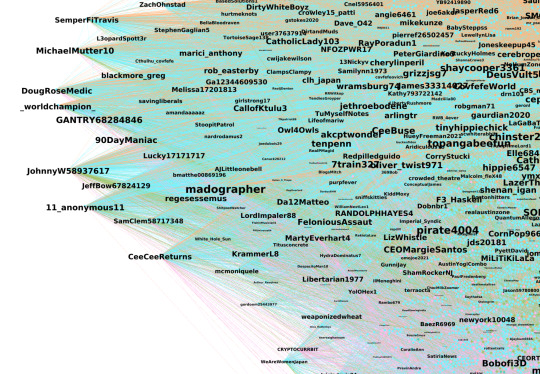
The pale blue green stuff ... cyber-libertarians maybe?
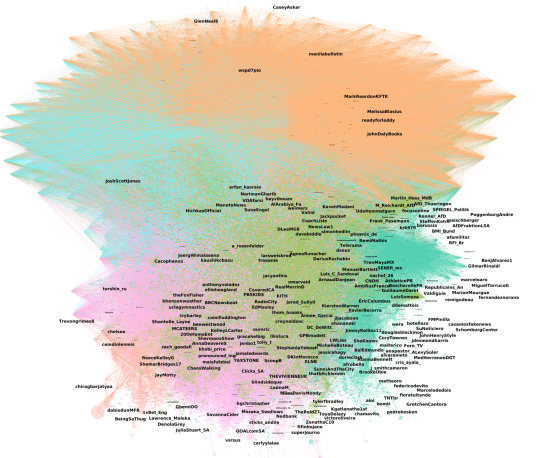
Here we see the clustering coefficients. Eigenvector is a friends of friends thing, this measures how likely accounts are to be part of fully connected subsets of a network. Both of these are ways of seeing CENTRALITY.

There are literally hundreds of centrality measurement methods but they're all part of eight different families. Gephi comes with a couple of these and there are a small sample of others available as plugins. They've all got some sort of numeric basis that characterizes what they do, but my use is a bit squishier than that. I play with them in the context of whatever network I'm looking at until I feel like I've got some insight.
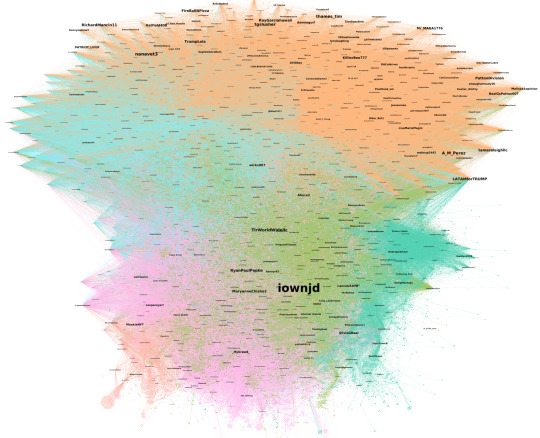
Here I gave PageRank a try. I'm starting to wonder if this @iownjd guy is The Gambia's botnet warlord/cryptoking shadow financier of the Twitter purchase.
Less tongue in cheek, looking at the restorations as a mass shows an LOL, wrapped in a WTF, concealed inside an STFU. Nobody is paying for this, at least not yet, but it's got me curious ... so I'm going to scratch that itch, if for nothing else, it'll get me going on overdue maintenance.
Operating this system is akin to owning a Shovelhead Harley - no fixin' leads to no ridin'. Everything got converted to Docker ... except Elasticsearch. It's time to shift to Elasticsearch 8, but in an upgrade attempt I learned I've still got legacy 6.5.4 indices lurking. Twitter's API 2.0 has been emerging for the last couple years but I've never touched it. ArangoDB is, among other things, a full featured graph database, but it's just a fancy key:value store for me at this point. Graphistry sprouted an ArangoDB plugin since the last time I used it, but I'm still feeding it NetworkX generated GML when I run into something too bulky for Gephi. The rudimentary workflow management in RabbitMQ broke down a while ago, due to what I just discovered to be an obscure ArangoDB bug, but I just let stuff run in the legacy Python/Walrus/Redis thing I cobbled up back in 2019.
So there you have it. SOMETHING is going on over there, but what? Being able to make any sort of coherent statement is going to require a LOT more elbow grease.
1 note
·
View note
Text
Fictitious tortoise making an attempt to vote for Britains subsequent prime minister raises safety considerations over on-line poll
Because the U.Ok. lurches from one disaster to a different, destabilizing world monetary markets within the course of, safety considerations are rising over the legitimacy of a vote for its subsequent prime minister.
Camilla Cavendish, a former head of coverage beneath David Cameron’s last Conservative authorities, warned on Thursday that the celebration’s management contest subsequent week could be simply influenced by exterior actors.
“There’s an organization referred to as Tortoise Media, and it has signed up as Conservative Get together members a tortoise, an American and a Ukrainian, and so they pay 25 kilos every,” she mentioned on BBC’s flagship weekly political debate program, Query Time.
“That tortoise, that Ukrainian and that American—who’re fictitious by the way in which—at the moment are eligible to vote on this election. What does that say about our democracy?”
A spokesman for the Conservative Marketing campaign Get together Headquarters acknowledged that the try was made, however mentioned on Friday they might not obtain a vote due to “computerized purple flags” used to weed out malicious actors.
He declined nevertheless to offer specifics.
“That group did make some pretend purposes. They didn’t get a vote within the final management contest, they won’t get a vote on this one,” the CCHQ spokesman informed Fortune. “These purposes have been rejected.”
All people wants to observe this clip of Camilla Cavendish describing how Tortoise Media have registered a tortoise, an American, and a Ukrainian, none of which exist, to be eligible to vote within the Tory management contest as Conservative members. Normal Election please #bbcqt pic.twitter.com/hgvqv0D3f4
— Stuzi (@Stuzipants) October 20, 2022
When Boris Johnson agreed to step down following a litany of scandals, roughly 140,000 members of his Conservative Get together select from two candidates to switch him as chief.
The then-foreign secretary, Liz Truss, beat out the chancellor of the exchequer, Rishi Sunak by a margin of 57% to 43%.
Truss on Thursday mentioned she would resign after taking the nation to the precipice of a monetary collapse spawned by a radical libertarian funds that foresaw funding tax breaks for the wealthy with profit cuts to the poor, a “reverse Robin Hood”, in addition to heavy borrowing.
Cybercrime unit on alert
Her ousting didn’t come as a shock: bookies had wager the shelf lifetime of a head of lettuce would outlive her premiership.
When Truss is changed subsequent Friday, her temporary stint in workplace may have damaged the report for the shortest time period in workplace by any U.Ok. prime minister, which was set all the way in which again in 1837.
Considerations over subsequent week’s management contest have heightened partially because of the hasty nature of the competition which might make the voting process susceptible to hackers.
The earlier management race dragged on for weeks. This time Tory celebration members might be requested to lodge their ballots just about reasonably than on paper if a couple of particular person wins the assist of over 100 Tory MPs.
The Nationwide Cyber Safety Middle, an arm of the nation’s intelligence providers, mentioned it was carefully following the method.
“Because the UK’s nationwide technical authority for cyber safety, we proceed to offer recommendation to the Conservative Get together, together with on safety issues for on-line management voting,” it mentioned in an announcement to Fortune on Friday, declining to remark additional.
Join the Fortune Options electronic mail listing so that you don’t miss our largest options, unique interviews, and investigations.
Originally published at Irvine News HQ
0 notes